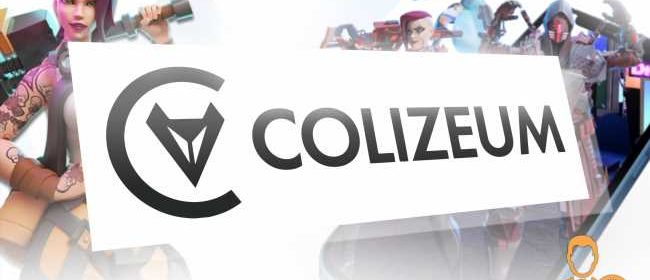Mobile Gaming SDK Colizeum Raises $8.4 Million in Latest Fundraising Round, Adds DOTA Legend Wusheng to the Team

Colizeum, an innovative SDK geared toward mobile game developers to implement tokenized game modes and Play-to-Earn economy without prior knowledge in blockchain development has raised $8.4 million in its latest fundraising round.
Colizeum Raises $8.4 Million in Funds
Today, mobile gaming-based SDK Colizeum announced the successful closure of its latest fundraising round where it was able to raise a total of $8.4 million in funds.
For the uninitiated, by using the Colizeum SDK solution, any game developer can integrate tokenized game modes and play-to-earn mechanics in their game. Essentially, Colizeum allows any game developer to turn their existing game into a blockchain play-to-earn model.
The funding round witnessed participation from several noted investors from the blockchain space. The project’s latest funding round was led by Deribit, SevenX Ventures, Axia8, LD Capital, and Genblock Capital.
The round also witnessed participation from other investors such as TPS Capital, Momentum6 (Lumen Capital Group), DWeb3, X21, Profluent Ventures, Good Games Guild (GGG), CRT Capital, Au21 Capital, Pluto Digital, Basics Capital, and Tokenomik.io.
Further, Colizeum also welcomes one of the world’s most renowned DOTA players to its team, Wusheng (Sheng Wu).
Colizeum will leverage Wu’s expertise in the video game industry to bring more attention to its offerings for the current and future mobile game developers. In addition, game developers can combine different monetization options that include existing models with tokenized game modes.
Fostering the Growth and Revenue Potential for Mobile Game Developers
Colizeum enables game developers to monetize while scaling in Tier 3 markets which have inarguably been the biggest hindrance for game developers. In addition, the solutions allow the developers to acquire additional monetization layers with almost 0 percentage fees compared to upwards of 30 percent typically charged by traditional app stores for every in-game purchase.
Moreover, Colizeum vastly reduces user acquisition costs and foregoes ad networks that usually juice the most revenue from in-app advertisements.
All of this is made possible by Colizeum, without any prior blockchain development experience.
It must be highlighted that Colizeum is not competing with the traditional mobile app stores. Instead, it aims to enable the co-existence of traditional monetization options and play-to-earn mechanics.
The Utility of the ZEUM Token
The ZEUM token is central to the Colizeum ecosystem for the reasons listed below.
Play-to-earn Model
Colizeum’s ZEUM token makes it possible to connect all game developers and players into one platform while at the same time bringing benefits to both creators and gamers.
Attention Marketplace
The ZEUM token also interacts with Colizeum’s attention marketplace which is essentially an attention widget to introduce content to a huge gamer base. The same can be accessed by advertisers through staking ZEUM. In all, staking more tokens yields a larger banner with a higher priority rating.
Tournaments
Colizeum also supports monetized tournaments via participation fees or organizer-provided budgets. Game developers are eligible to receive a cut of every tournament’s funding.
Prediction Markets
Users can use the ZEUM token to bid on the outcome of any tournament or in-game event. In essence, they can establish a huge derivative gaming market for game developers and gamers.
A wide variety of other features will be added later, one of them being NFT Integrations. Game developers will be able to mint their game assets as NFTs.
A Brief History of Colizeum
Colizeum was founded in 2021 and its team combines years of experience in mobile gaming with expertise in the crypto and blockchain industries. Further, the team has founded Beetroot Lab and has, to date, noted significant success and awards for products. These include Dystopia: Contest of Heroes – developed under the banner.
More than 6 months have been put into the exhaustive research and development of the project. At present, the team is in talks with certain game developers onboarding their mobile games once the Colizeum SDK reaches its beta stage.
Commenting on the development, Davis Ziedins, Co-founder of Colizeum, said:
“Last year brought significant changes to the mobile gaming industry, which led to game developers of every size to discover new monetisation methods and user accession tactics in order to continue to compete in the current market. Our mission is to build a set of tools that lets any traditional game developer to broaden their game monetisation methods by implementing tokenized games modes and Play-2-Earn economy in their existing and future games and at the same time to unlocking new gaming markets.”
Adding:
“We’re proud to serve the growing game development community and to offer a set of tools which will help developers to focus on what they know the best – building great games! Whole Colizeum team is honoured that Colizeum is backed by outstanding industry professionals and enormous communities which are helping us to build the product and has helped us to set the ambitions of the project on a whole different level.”
Similar sentiments were echoed by Michael Swan, Managing Director at Tokenomik Inc., who said:
“Tokenomik views Colizeum as an excellent proxy exposure to the vast NFT/play-to-earn gaming multiverse segment, which continues to expand exponentially, making it increasingly difficult to identify long term popular gaming platforms.”
Adding:
“Colizeum, through its blockchain centric game development toolset, represents an excellent macro-level collaboration opportunity, with its class-leading modular game building tools, which has already attracted some of the best-in-breed developers to the ecosystem. We are delighted to be an early collaborator in this fantastic project, founded by an experienced leadership and development team.”
Website | Discord | Twitter | Telegram
Related posts:
Source: Read Full Article
